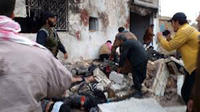-
Sen. Rubio proposes that Congress, not DHS, devise border security plan
Senator Marco Rubio (R-Florida), a member of the bipartisan group which drafted the immigration bill which passed the Senate Judiciary Committee and which will be brought to the floor of the Senate next week, is working on a proposal which will dramatically change the approach to devising and assessing border security in the bill. The bill now has DHS entrusted with the responsibility of devising a border security plan and determining whether the plan has been adequately implemented. Rubio proposes that Congress would assume these responsibilities, saying that the current plan for borer security is not robust enough to convince many Republican lawmakers to support the immigration bill.
-
-
Critics: Gang of Eight bill will create new surge of illegal immigration
The Federation for American Immigration Reform (FAIR), a nonprofit organization critical of U.S. policies toward both legal and illegal immigration, says the Gang of Eight bipartisan immigration reform bill will not solve the U.S. illegal immigration problem, but rather exacerbate it. FAIR notes that in 1986, the Reagan administration pushed a bill through Congress which gave amnesty to nearly three million illegal aliens — but the problem of illegal immigration has only grown worse.
-
-
Turmoil in Turkey is about the future identity of the country

The demonstrations in Istanbul began as a neighborhood protest against the government’s plan to build a shopping mall on the site of a popular park. Soon, however, the demonstrations spread to other cities, and spokespeople for the demonstrators emphasized that the park issue was symbolic, and that it stood for deeper issues. This growing unrest may yet unleash deeper forces within Turkish society.
-
-
U.S. unlikely to meet its biofuel goals

The Energy Independence and Security Act of 2007 (EISA) mandates that by 2022 the United States derive fifteen billion gallons per year of ethanol from corn to blend with conventional motor fuels. A new study says that if the climate continues to evolve as predicted by the Intergovernmental Panel on Climate Change, the United States stands little to no chance of satisfying its biofuel goals.
-
-
McCain: military aid to rebels, no-fly zone necessary as Assad gaining “upper hand”

Senator John McCain (R-Arizona) said it is “ludicrous” to believe that Syrian president Bashar al-Assad would negotiate a diplomatic solution to the county’s civil war at an upcoming summit. McCain says that providing military aid to the anti-Assad rebels and imposing a no-fly zone over Syria would more likely yield results than a summit meeting in Geneva.
-
-
Government-developed standards not an effective cybersecurity approach: analyst
DHS said the department has “recently learned of a vulnerability that existed in the software used by a DHS vendor to process personnel security investigations.” analyst says that it is bad enough that hackers gained access to the personal information of thousands, but what is even more worrisome is the fact that DHS, with it spotty cyber security record, has been placed in charge of regulating the cybersecurity efforts of critical infrastructure industries.
-
-
Hagel says Chinese cyberattacks a “growing threat”
Defense Secretary Chuck Hagel warned of a “growing threat” of cyberattacks against the United States, saying that America and its allies need to “establish international norms of responsible behavior in cyberspace.” Hagel spoke to an audience of defense analysts and defense ministers from Asia and Europe at the annual conference of the International Institute for Strategic Studies on Saturday.
-
-
Reid confident immigration reform bill will pass the Senate

Senate Majority Leader Harry Reid (D-Nevada) said passage of the immigration bill will be relatively easy, and that he believes the bill will be supported by at least eight Republican, in addition to votes from nearly all Democratic members.
-
-
Bloomberg group presses lawmakers to close FBI’s gun “terror gap”
New York City mayor Michael Bloomberg’s group, Mayors Against Illegal Guns, has turned its attention to Senators Kelly Ayotte (R-New Hampshire), Jeff Flake (R-Arizona), and Max Baucus (D-Montana) to gain their support for a gun bill which would prevent people on the U.S. terrorist watch list from passing background checks for guns.
-
-
Former CIA chief: NYPD surveillance would have prevented Boston-like attacks

Former CIA director Michael Hayden said a terror attack like the Boston Marathon bombings would never have taken place in New York City. Hayden, who also headed the National Security Agency (NSA), said the New York Police Department’s (NYPD) broad campaign of spying on the Muslim communities in the city would have helped officials identify the radical tendencies of the alleged bombers, thus preventing the attack.
-
-
Lawmaker offers a way to finance U.S. infrastructure investment -- with no taxpayers’ money

Representative John Delaney (D-Maryland) says has an answer to the nation’s infrastructure problems, and that it will not cost taxpayers a dime. The money will be raised through the sale of special bonds, not guaranteed by the government, to companies that earn profits outside the United States.
-
-
House panel cuts DHS chemical plant monitoring program’s budget
Budget authors in the House proposed cutting almost $9 million from what DHS had requested for high-risk chemical tracking in the 2014 fiscal year. The House Appropriations Committee, indicating its lack of confidence in DHS’s oversight of fertilizer plants like Texas’s West Fertilizer Company, which exploded earlier this year, also withheld $20 million from the program until DHS responded in detail to questions the committee sent the department.
-
-
California Democratic lawmakers want a go-slow approach to fracking
California may be on the verge of an oil rush. It is estimated that hydraulic fracturing, or fracking, at the Monterey Shale formation may tap reserves of fifteen billion barrels of oil. Democratic lawmakers do not see it that way, and have proposed numerous anti-fracking bills aiming to control the use of the controversial technology. Ten bills have been tabled so far, and more are on the way.
-
-
Chinese government hackers steal designs of advanced U.S. weapons systems
The Chinese government has been conducting a broad, sustained, and disciplined campaign of cyberattacks against U.S. government agencies, critical infrastructure, private companies, and news organizations. The public version of a study prepared for the Pentagon by the Defense Science Board now says that Chinese government hackers have also been able to penetrate the computer networks of all the major U.S. defense contractors, stealing the designs and specifications of the most advanced weapon system in the U.S. arsenal, and gaining insights into broad technologies on which U.S. military advances are based.
-
-
What we keep forgetting about immigration reform
Next month, when the Senate debates immigration reform, our elected politicians should be reminded of their responsibility to negotiate new immigration laws which finally bring sanity and fairness to all Americans and, as well, to those who would choose to become new Americans.
-
More headlines
The long view
Factories First: Winning the Drone War Before It Starts
Wars are won by factories before they are won on the battlefield,Martin C. Feldmann writes, noting that the United States lacks the manufacturing depth for the coming drone age. Rectifying this situation “will take far more than procurement tweaks,” Feldmann writes. “It demands a national-level, wartime-scale industrial mobilization.”
No Nation Is an Island: The Dangers of Modern U.S. Isolationism
The resurgence of isolationist sentiment in American politics is understandable but misguided. While the desire to refocus on domestic renewal is justified, retreating from the world will not bring the security, prosperity, or sovereignty that its proponents promise. On the contrary, it invites instability, diminishes U.S. influence, and erodes the democratic order the U.S. helped forge.
Fragmented by Design: USAID’s Dismantling and the Future of American Foreign Aid
The Trump administration launched an aggressive restructuring of U.S. foreign aid, effectively dismantling the United States Agency for International Development (USAID). The humanitarian and geopolitical fallout of the demise of USAID includes shuttered clinics, destroyed food aid, and China’s growing influence in the global south. This new era of American soft power will determine how, and whether, the U.S. continues to lead in global development.
Water Wars: A Historic Agreement Between Mexico and US Is Ramping Up Border Tension
As climate change drives rising temperatures and changes in rainfall, Mexico and the US are in the middle of a conflict over water, putting an additional strain on their relationship. Partly due to constant droughts, Mexico has struggled to maintain its water deliveries for much of the last 25 years, deliveries to which it is obligated by a 1944 water-sharing agreement between the two countries.
How Disastrous Was the Trump-Putin Meeting?
In Alaska, Trump got played by Putin. Therefore, Steven Pifer writes, the European leaders and Zelensky have to “diplomatically offer suggestions to walk Trump back from a position that he does not appear to understand would be bad for Ukraine, bad for Europe, and bad for American interests. And they have to do so without setting off an explosion that could disrupt U.S.-Ukrainian and U.S.-European relations—all to the delight of Putin and the Kremlin.”
How Male Grievance Fuels Radicalization and Extremist Violence
Social extremism is evolving in reach and form. While traditional racial supremacy ideologies remain, contemporary movements are now often fueled by something more personal and emotionally resonant: male grievance.
